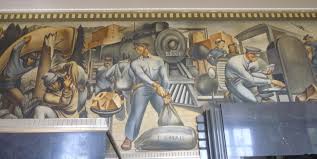
Thursday
Among our many areas of concern is the threatened demise of the U.S. Postal Service. Because of the pandemic, it is losing billions every month, and apparently Donald Trump wants it to fail, perhaps because that would make mail-in voting impossible. (It would also make Amazon deliveries harder, and Trump has a beef with CEO Jeff Bezos since he also owns the “fake news” Washington Post.)
I am reposting a 2012 essay on Thomas Pynchon’s novel about an underground postal service. At the time I wrote it, the postal service was also under siege. While I can’t imagine that members of Congress with large rural populations would let it die, I didn’t think such states would also reject—and continued rejecting even during a pandemic—Medicaid expansion. Sometimes ideology wins out over the needs of one’s constituents.
I wrote in that essay that bureaucracy is necessary because our society is mindbogglingly complex. Covid-19 should make this clear to everyone as we watch bumbling amateurs try to do the work of seasoned professionals. Meanwhile, libertarians and selfish people who resist settle-in-place orders, social distancing, and required masks will cause more deaths.
One further thought about this reposted essay: I don’t explore why Pynchon chose to write a novel about a crazy conspiracy theory. He may be making the point that, when. a society becomes large, complicated, and impersonal, people use stories to bring it within their sphere of comprehension. Conspiracy theories are compelling stories that flourish amongst populations that feel powerless and/or alienated and that are unable or unwilling to grapple with nuance and complexity. The seeming intricacy of conspiracy theories conceals the basic black and white simplicity of the underlying drama..
Conspiracy theories that arose following the attack on Pearl Harbor, the Kennedy assassination, and 9-11 took years to die, if they ever did. Expect to see a wave of coronavirus-related conspiracy theories in the upcoming months and years.
Reprinted from Nov. 27, 2012
On the list of things to worry about that you didn’t know you had to, we must add the U.S. Postal Service. Apparently, the USPS is facing a $5.5 billion default, due in part to the decline of postal mail but much more to Congressional meddling. Certain rightwing elements of the GOP that want the USPS fail are refusing to allow it to adapt and modernize and are demanding (this from the Bush-Cheney years) that it prefund retireee health benefits 75 years into the future–something no other organization is required to do. This brings to mind the greatest literary work I know about postal systems.
Actually, Thomas Pynchon’s The Crying of Lot 49 is the only literary work I know about the postal service. The book features a governmentally licensed postal monopoly (the German mail service Thurm und Taxis) and its ruthless attempts, in the 17th century, to suppress a private mail service (the Tristero). If you know anything about Pynchon, you probably know that he specializes in paranoia. Our current rightwing paranoia about government makes the book particularly relevant.
Here’s how American paranoia enters into the situation. According to Felix Salmon of Reuters, the Postal Service could solve its problems if Congress allowed it to evolve. For instance, post offices could provide banking services, sell fishing, hunting, and other kinds of licenses, and undertake a host of other transactions that the public would find very useful. Unfortunately, there are those on the right that accept as gospel Ronald Reagan’s libertarian article of faith that “the nine most terrifying words in the English language are ‘I’m from the government and I’m here to help.’” These people are against the USPS becoming more helpful.
One could imagine them fantasizing about the Tristero. In Pynchon’s novel, the Tristero works underground to escape Thurn und Taxis’s attacks. The question is whether they are still at work, secretly undermining today’s USPS monopoly with private mail delivery. A libertarian fantasy would have it that such a private sector organization would be more profitable.
Protagonist Oedipa Maas stumbles across the Tristero when, as executrix of the estate of a former lover, she comes across stamps that may have been used—and maybe are still being used—by the Tristero. As she researches the organization, she starts seeing—or thinks she sees—signs of the Tristero everywhere, especially the muted postal coach horn. (A simple horn, not muted, has been the sign of Thurn and Taxis.) Tristero’s mailboxes, she comes to believe, are metal containers labeled W.A.S.T.E., which stands for We Await Silent Tristero’s Empire. Wherever there is governmental oppression, there is Tristero secretly fighting back.
In our own society, many on the right claim allegiance to a version of the Tristero. They are heroically resisting government attempts to administer vaccines, teach children critical thinking, brainwash them into believing that climate change is real, take God out of Christmas, seize their guns, impose foreign-born presidents, and on and on. Likewise, in Pynchon’s fevered imagination, Oedipa and America in general are being overwhelmed by huge bureaucracies and urban sprawl that seek to crush individuality. Tristero represents an elusive hope that a secret organization exists that will fight back.
Paranoia makes for great fantasy. The more prosaic reality, however, is that we are a very large and complex country that needs complex bureaucracies if everything is to function. These bureaucracies are staffed, for the most part, by competent, well-meaning people who are doing their best. One of their jobs is delivering the mail.
They aren’t doing a bad job of it. They could be doing an even better job if they were not battling fantasists out to prove some ideological point.